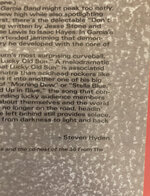loving the side discourse on music writers
Haha I'm glad that not everyone has been alienated by the back and forth we've had on this.
do you remember brent dicrescenzo
@Ericj32 ?
I've never read any of Brent DiCrescenzo's stuff. I just now read his Kid A review, and I do like how he writes about the songs when he goes track by track, but the first few paragraphs of his review are a little over the top for my taste. He also includes a lot about his own personal experiences that, to me, just feels kind of annoying to make the reader get through in order to actually get to the discussion about Kid A. I get that some people enjoy those personal anecdotes, but to me it just feels kind of disrespectful to spill nearly as much ink sharing fun facts about yourself as you do actually analyzing the album itself. Sometimes it feels like music writers think that they themselves are the main attraction rather than the album that took months or years to create. I don't know why but I feel like I've had more bad experiences reading Pitchfork reviews than good ones, so I rarely read any of their reviews unless I'm looking for specific details about an album and can't find anything else on the internet written about that album haha. I've already thrown out enough opinions about why certain things aren't for me in this thread, though, so I'll just leave it at that haha. Based on his review of Kid A, I'd be willing to check out more of Brent's writing, but yeah I don't honestly read much writing about music anyway.
in terms of 'taste' i tend to agree with kitty empire
but reviews are just fun reads; you can either agree or disagree and it's not going to change yr opinion one way or the other
I did check out a review by Kitty Empire of James Blake's latest album just now based on you mentioning her and I really like:
(1) how short the review is because she doesn't talk at all about herself, her life experiences/hobbies/etc.
(2) she doesn't talk about other bands, or other people's takes on this album
(3) she's not trying to assign meaning, value, or importance to it one way or the other;
(4) the way she sinks her teeth into the music: "
At first this elegant compendium of digital chamber music and subtle trap pop works like a breakup album. Many affecting tracks detail the sharknado of outrage and bewilderment in Blake’s trademark delicate soprano, offset occasionally by well-chosen collaborators (SZA, or rappers JID and SwaVay) or startlingly pitch-shifted vocals."
When I read this, it seems clear that she spent some time thinking carefully about how to describe what the album sounds like. As the kids say, she understood the assignment. "Sharknado of outrage and bewilderment" is both hilariously bizarre and, the more I think about it, surprisingly apt as a description of the emotion in James Blake's music on this record because it grabs your attention and captures, in just one word, the idea that those feelings of outrage and bewilderment are: overwhelmingly powerful, suddenly appearing out of nowhere and blindsiding you like a force of nature [I don't know much about sharknados but I'm assuming that that's how they work], and also ridiculous and not really...real. This description of the tone of the album, combined with descriptors like "digital chamber music", "subtle trap pop", "delicate soprano", "startlingly pitch-shifted vocals" adds up like an equation to give you the sum that kind of pretty closely approximates what James Blake's music sounds like. If I hadn't heard the album or any of James Blake's music before reading this review, I'd have a pretty good idea of what to expect based on these two sentences alone. As someone who has heard the album, I still get the value of reading it and thinking to myself "wow, yes, I never thought about it in those terms, but that is exactly what his music is like." On the other hand, if I was trying to describe James Blake to someone, I'd have to think about it for a while and probably would just end up saying something like "he sounds kind of sad and soulful and sings in a high falsetto that is beautiful but kind of tortured sounding, but the songs themselves are electronic and kind of experimental sounding". I think that's an ok description of it, but it's not as surgically specific or nearly as fun to read as her review. I'd probably have to spend like 20-30 minutes thinking about it to come up with anything quite as descriptive as those two sentences of hers, and I'd probably never think to use the word "sharknado" haha.
So, yeah, if you have any other reviews of hers that you'd recommend, I'd be interested in checking those out. I just found a recent review she did of a Nick Cave live show and that is hitting the spot for me, too. She describes Nick Cave as looking "suave and insectoid" and yeah, that checks out. She talks about the "maelstrom of grief and existential questioning" that inspired the album Ghosteen, and mentions his "swaggering, blood-spattered back catalogue". I just love how descriptive and economical her writing is, and it feels like she's giving me information that is more factual than opinion-based, if that makes sense, because she's just trying to describe it on its own terms. I don't have to wade through any fluff about her personal life or what she thinks about other unrelated topics or whatever. She gets to the point and she doesn't get sidetracked. How do we get her to write a book about Kid A?

I'm not familiar with Alexis Petridis either, but I'll try to check out some of his stuff. Thanks for sharing these names!

